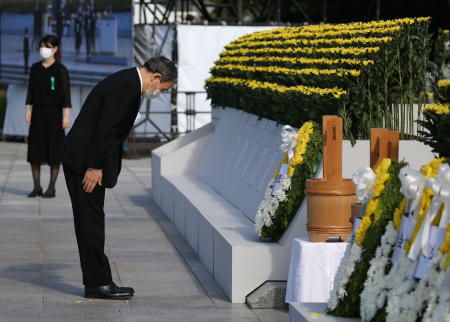
- ARAB NEWS
- 02 Jul 2025

HIROSHIMA: Japanese Prime Minister SUGA Yoshihide pledged Friday to provide broad relief swiftly to people exposed to radioactive “black rain” that fell soon after the 1945 US atomic bombing of the western Japan city of Hiroshima.
“We’ll quickly decide our response together with the Hiroshima prefectural government and the Hiroshima city government, and provide relief,” Suga told a press conference in the city, referring to people who are in a situation similar to that for plaintiffs in a damages lawsuit over health damage from the black rain.
The government is expected to consider issuing swiftly health handbooks certifying these people as hibakusha atomic bomb survivors.
Suga made the remarks after the government last month decided not to appeal a high court ruling that recognized all 84 plaintiffs in the lawsuit as hibakusha. At the time of the atomic bombing, the plaintiffs were living outside a state-designated area subject to black-rain relief.
Suga was visiting Hiroshima to attend an annual memorial ceremony for victims of the atomic bombing. Friday marked the 76th anniversary of the nuclear attack Aug. 6, 1945, in the closing days of World War II.
In the ceremony, Hiroshima Mayor Kazumi Matsui urged the Japanese government to sign and ratify the U.N. nuclear weapons ban treaty, which took effect in January, and to participate in the first meeting of the parties to the treaty.
But Suga said that the treaty “has not obtained support from nuclear weapons states including the United States, as well as from nonnuclear weapons states,” adding: “We have no plan to sign it at the moment. We will carefully examine whether we should join a meeting of parties to the treaty as an observer.”
On the COVID-19 crisis, Suga rejected the view that the ongoing Tokyo Olympics has led to a spread of the novel coronavirus, noting that flows of people did not increase in entertainment districts in Tokyo thanks to many people working from home and traffic controls in line with the Games.
Whether to allow live spectators at the Tokyo Paralympics, to be held between Aug. 24 and Sept. 5, will be determined through talks among the Japanese and Tokyo metropolitan governments, the Tokyo Games organizing committee, the International Olympic Committee and the International Paralympic Committee after the end of the Olympic Games, Suga said.
“The decision will be made based on general rules concerning sports events under a COVID-19 state of emergency and the infection situation from now,” he said.
Tokyo, three prefectures neighboring the Japanese capital and two other prefectures are under a coronavirus state of emergency that is slated to run until Aug. 31. For the Olympics, spectators are banned at most venues.
On a possible dissolution of the House of Representatives, the powerful lower chamber of the Diet, Japan’s parliament, for a general election, Suga said only that the top priority is being given to coronavirus measures as a matter of course. The term of office for the current Lower House members is set to end Oct. 21.
JIJI Press